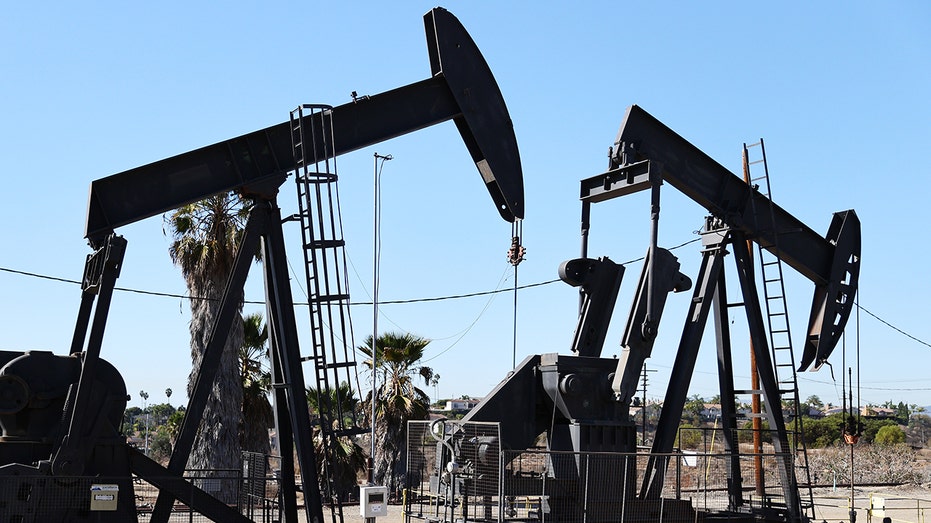California denies most fracking permits ahead of 2024 ban
California's Geologic Energy Management Division has rejected an unprecedented 109 fracking permits this year
How America Works: Fracking in western Pennsylvania
Host Mike Rowe showcases Cameron Energy's fracking operation in western Pennsylvania on 'How America Works' on Fox Business
California regulators haven't approved permits for the controversial oil and gas extraction process known as fracking since February, effectively phasing out the process ahead of Gov. Gavin Newsom's 2024 deadline to end it.
The state's Geologic Energy Management Division, known as CalGEM, has rejected an unprecedented 109 fracking permits in 2021, the San Francisco Chronicle reported. That's the most denials the division has issued in a single year since California began permitting fracking in 2015. Fifty of the permits, mostly from Bakersfield-based Aera Energy, were denied based solely on climate change concerns.

Protesters prepare to take down a makeshift oil derrick that was set up in front of the California State Office Building to protest fracking in San Francisco. (AP Photo/Jeff Chiu, File)
State oil and gas supervisor Uduak-Joe Ntuk wrote in a September letter to Aera that he could "not in good conscience" grant the permits "given the increasingly urgent climate effects of fossil-fuel production" and "the continuing impacts of climate change and hydraulic fracturing on public health and natural resources."
CLICK HERE TO READ MORE FROM FOX BUSINESS
Newsom, a Democrat, called in 2020 for state lawmakers to ban the practice by 2024. But a proposal before lawmakers failed, leading Newsom to direct CalGEM to proceed with the timeline on its own. It's only one piece of Newsom's climate change agenda, which includes a complete end to oil and gas production in the state by 2045, long after he's left office.
Kern County, where most fracking in the state occurs, and the Western States Petroleum Association have sued the state over the denials. WSPA's lawsuit, filed in October, argues state law requires CalGEM to permit fracking if it meets technical requirements and that the denials amount to a de facto ban on the process that hasn't been approved by the legislature.
A hearing in the Kern case is scheduled for Monday, and the state must respond to WSPA's lawsuit by Dec. 2.
Fracking is the process of injecting a high-pressure mix of mostly water with some sand and chemical additives into rock to create or expand fractures that allow for the extraction of oil and gas. Permitted fracking operations account for just 2% of oil production in California. But the practice is controversial due to concerns about the chemicals used in the fracking fluid contaminating groundwater.

Oil pumpjacks stand in the Inglewood Oil Field on November 23, 2021 in Los Angeles, Calif. (Photo by Mario Tama/Getty Images)
Environmental justice organizations representing low-income communities and people of color have protested fracking for its potential water contamination and the methane released by the process. Methane is a highly potent greenhouse gas.
BIDEN'S PUNY OIL RELEASE IS ONLY A FEW DAYS OF SUPPLY
Juan Flores, a community organizer based in Kern County with the Center on Race, Poverty & the Environment, said by denying the permits Newsom and his administration are living up to expectations set by voters.
"This is a type of action that we expected," he said.
WSPA said in its lawsuit that the state's permitting process includes stringent requirements designed to protect public health and safety.

Pumpjacks operate in Bakersfield, Calif. California regulators are citing climate change for the first time as they deny new permits for hydraulic fracturing, a process used to extract oil and gas from the ground. (AP Photo/Jae C. Hong, File)
These actions "don't really deliver the positive benefits for a fight against climate change, but what they do is impose big impacts on Californians — to their finances, to their freedoms and, essentially, how they live and work every single day," WSPA President Catherine Reheis-Boyd told the Chronicle.
CalGEM has approved just 12 fracking permits this year, down from 83 in 2020 and 220 in 2019.
In his letter to Aera explaining why the state denied permit applications, Ntuk cited extreme heat, drought and wildfires as examples of the dangers caused by climate change. He argued that CalGEM must ensure the activities it regulates match the state's environmental, public health and climate change goals. He said a 2014 law that gave the agency permitting power over fracking does not require the state to approve permits even if applications are complete.
CLICK HERE TO GET FOX BUSINESS ON THE GO
Kathy Miller, an Aera spokeswoman, did not respond to an Associated Press email seeking comment.




















